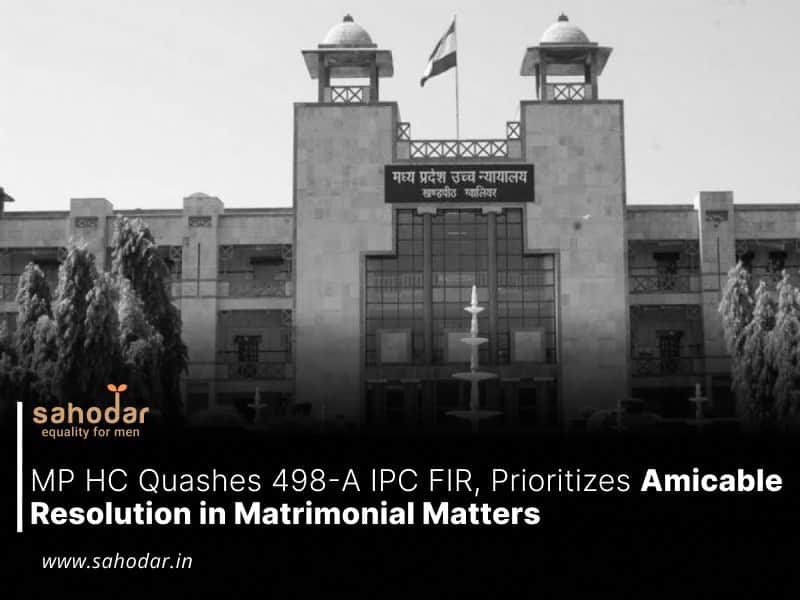The Madhya Pradesh High Court has affirmed that the overarching objective of the law transcends mere punitive measures and extends to the preservation of societal peace, serenity, and concord. Emphasizing the paramount importance of conciliation in matrimonial discord, the Court has underscored that such settlements yield benefits not only to the involved parties but also to the broader social fabric.
In the case at hand, the petitioners sought the quashing of an FIR (First Information Report) registered against them. The complainant, who is the wife, had lodged the FIR, alleging transgressions under Sections 498-A, 323, and 34 of the Indian Penal Code, in conjunction with Section 3/4 of the Dowry Prohibition Act.
A Bench of Justice Prem Narayan Singh held, “this Court is of the considered view that the aim and object of law is not only to punish the offenders, but, also to maintain peace, tranquility and harmony in the respective society. If compromise between husband and wife is effectuated by the attempts of their family members, it will not only be good for society but also beneficial for their remaining life.”
Advocate Neelesh Agrawal appeared as counsel for the Petitioners, while Advocate Rajesh Joshi represented the Respondents.
The complainant alleged harassment by the applicants and claimed monetary demands related to her intention to relocate to Australia. According to the complaint, the marital relationship deteriorated following a series of financial transactions and unsuccessful endeavors to secure a residential visa for Australia, which ultimately led to her return to India.
Subsequently, both parties reached a mutual understanding and jointly filed a compromise application under Section 320 of the Criminal Procedure Code (CrPC). The court registrar duly verified the validity of this compromise. Following this, the applicants petitioned the court to quash the proceedings based on this compromise agreement.
In its deliberations, the Court invoked pertinent Supreme Court precedents, notably the cases of Gian Singh Vs. State of Punjab and B. S. Joshi v. State of Haryana. In accordance with these precedents, the Court affirmed that Section 482 of the CrPC serves the purpose of averting the abuse of legal procedures and ensuring the administration of justice. The Court underscored the need for a judicious exercise of the power to quash criminal proceedings, with each case being subject to individual scrutiny, considering its specific factual and circumstantial nuances.
The Court highlighted that the compromise between the parties, especially in matrimonial disputes, should be encouraged as it promotes peace and harmony. The Court added, “The object of compromise is to settle down in life and live peacefully. Need not to say that such type of compromise should be encouraged for maintaining matrimonial relations between the parties so that the parties may think over their defaults and settle their disputes amicably by mutual agreement instead of fighting in a Court of law where it takes years and years to conclude and in that process the parties loose their precious years in attending their cases in different Courts.”
Considering the settlement between the complainant and the accused, the Court decided to quash the proceedings, stating that allowing the case to continue could lead to further disputes, which would be against the interest of the parties involved. The Court said, “the complainant and members of the family of her husband have settled their disputes and have decided to live separately and, therefore, hyper-technical view regarding the compromise can be counter productive and against the interest of the woman and against the pious object for which the disputes between husband and wife have been settled, because in case the criminal proceedings are still permitted to continue then fresh series of dispute may start between the wife and the members of the family of her husband.”
The Court granted the petition, annulled the ongoing criminal proceedings in the Trial Court, and concluded the matter.

